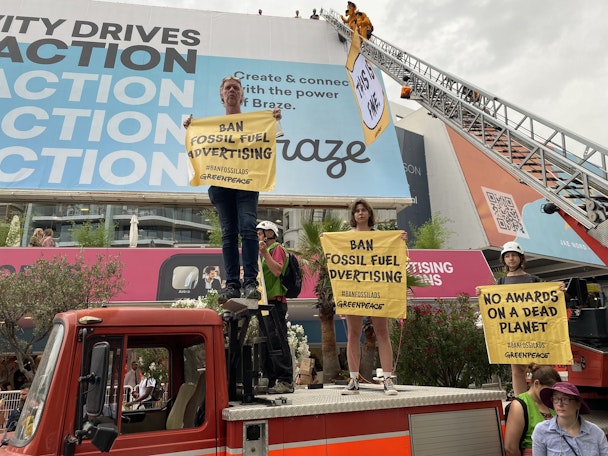French fossil fuel ad ban: what it means and the opportunity for agencies
Johnny White, a lawyer from Client Earth with expertise in greenwashing, and Jonathan Wise, co-founder of Purpose Disruptors, explain the legal risks.

Like Greenpeace’s protests at Cannes, France’s decision is a key moment in the industry tipping point / Image via Greenpeace
France is the first European country to ban fossil fuel advertising. The ban, which comes into effect next year, could see companies fined up to €100,000 for breaching the rules.
It may seem a strong move for a country to ban an entire category of advertising, but it’s odd that we’ve been happy to see advertising for fossil fuels for so long. Fossil fuels are proven to do wide-ranging harm to the planet and our health. Plans for their continued production will fuel a catastrophic climate future that nobody wants. The world’s governments are pursuing climate goals that necessitate a rapid reduction in fossil fuels.
Advertisement
The legal risks around fossil fuel advertising
Advertising for fossil fuel companies often poses legal risks as the law regulates environmental advertising fairly tightly. According to legal and regulatory standards, environmental claims in advertising must match scientific evidence. Often, this is as much about what adverts don’t say as what they do say.
The evidence is unequivocal that we must phase out fossil fuels for a fair chance at a liveable future. But too many fossil fuel companies are heading in the opposite direction – expanding production at a rate that will blow the world’s carbon budget.
Given the facts, it is difficult to see how any sustainability-related advertising by fossil fuel companies won’t breach consumer protection, competition and advertising rules.
It is hardly surprising then that litigation and regulatory interest are flaring up around fossil fuel advertising globally.
In France, TotalEnergies faces court action, supported by ClientEarth, over adverts claiming it is heading for net zero and a major player in the energy transition while expanding fossil fuel production.
In the Netherlands, KLM has been sued over claims it is making flying sustainable, while it plans unsustainable growth in fossil fuel-powered air traffic.
In Germany, a whole group of aviation and energy businesses faces litigation over ‘carbon neutral’ claims.
And in Australia and the US, gas companies are facing court action over statements that gas is “clean” and sustainable. The list goes on.
Advertisement
Further legal action coming down the track
In the UK, the ASA and CMA are both pursuing programs of work targeting greenwashing. The EU is introducing a raft of anti-greenwashing amendments to consumer protection law, restricting vague claims such as “environmentally friendly” and “carbon neutral,” and stopping claims such as “net zero by 2050” that don’t have a proper basis.
The changes don’t introduce anything new – they just clarify the application of the existing general rules to make it easier for regulators and claimants to hold advertisers accountable. In the UK, the government has gone to the CMA for advice on similar reforms.
The new law in France was a watered-down version of the action recommended by a French citizens’ assembly on climate. The citizens’ assembly called for an ad ban not only on high-emitting products but also on fossil fuel companies, mirroring the tobacco bans. A similar democratic exercise in the UK showed strong support for bans and restrictions too.
How should the industry act?
So, are we going to have to wait for the UK government for agencies to act differently?
A different question: ‘How can an agency or agency group take advantage of this situation?’
Smart money is on flipping the thinking – to gain a competitive advantage by being the first to drop a fossil fuel client.
Advertisement
Why?
The majority of high-spending clients in the UK have made public commitments to achieve net zero emissions by 2050. The rest will follow. The agency or network group that publicly drops its fossil fuel clients will gain a competitive advantage with that client base. It will be able to say: “Like you, we are committed to addressing our climate emergency. Like you, we are changing how we work and who we work with. That’s why we have chosen not to work with fossil fuel companies.” Dropping fossil fuel companies is a growth strategy with clients that are committed to net zero emissions.
It can be a compelling part of any pitch that has a sustainability element to the brief, by depositioning agency competitors that continue to work with fossil fuel companies.
It will shore up clients who question their agencies that currently work with fossil fuel companies.
It will help attract and retain the best, climate-concerned talent.
The French ad ban is important, but like the Greenpeace protests at Cannes, and the wave of anti-green-washing litigation and regulation, it is another event that moves the industry toward a momentous, inevitable tipping point.
This moment is the one where one agency or network group sees there are greater rewards in severing its ties with fossil fuel companies than maintaining them.
The question is: who is going to be the leader, and who is going to be left as laggards?
Jonathan White is a lawyer in climate accountability with ClientEarth and Jonathan Wise is a co-founder of Purpose Disruptors.